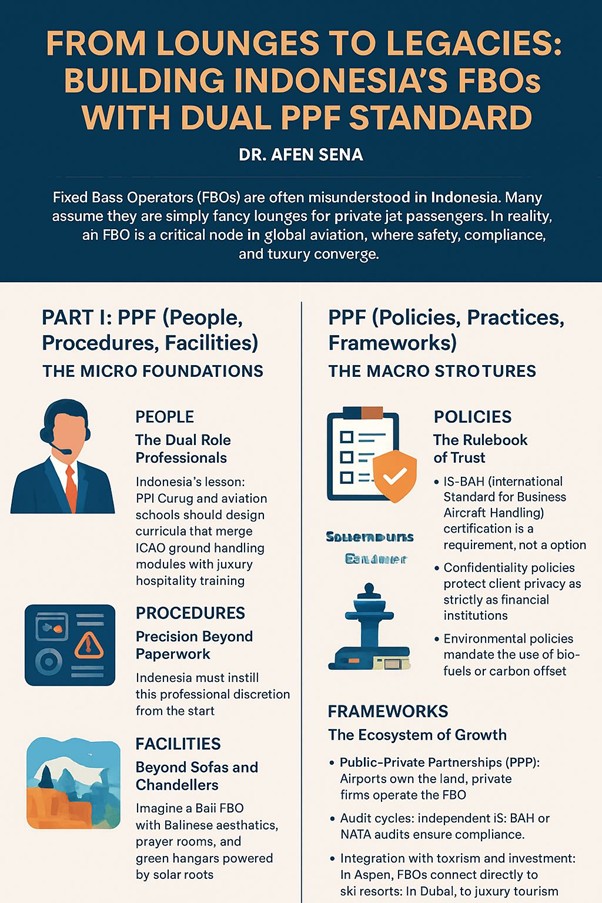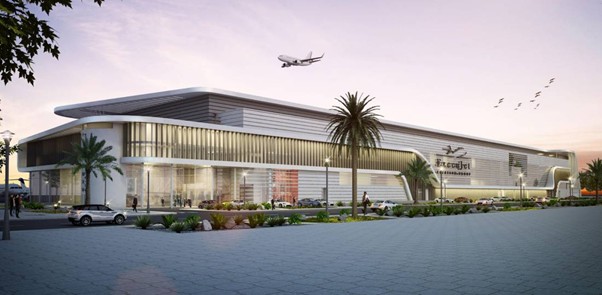Introduction: More Than a Lounge
Fixed Base Operators (FBOs) are often misunderstood in Indonesia. Many assume they are simply fancy lounges for private jet passengers. In reality, an FBO is a critical node in global aviation, where safety, compliance, and luxury converge.
Globally, the best FBOs — from Jet Aviation in Zurich to ExecuJet in Dubai — are not just service providers; they are symbols of trust. And trust, in aviation, is not built overnight. It rests on structures, people, and systems that consistently deliver under pressure.
To analyse this properly, we can apply not one, but two versions of the PPF lens.
- On the micro level: People, Procedures, and Facilities. These are the day-to-day pillars of any FBO.
- On the macro level: Policies, Practices, and Frameworks. These shape the ecosystem in which FBOs operate.
When combined, the two PPFs form a complete picture: what happens inside the FBO walls, and what governs them from the outside.

Part I: PPF (People, Procedures, Facilities) – The Micro Foundations
- People: The Dual Role Professionals
In ExecuJet Dubai, ramp staff can direct a Gulfstream G650 with precision, then switch seamlessly to pouring espresso for a head of state. This is the essence of dual competency.
Indonesia’s lesson: PPI Curug and aviation schools should design curricula that merge ICAO ground handling modules with luxury hospitality training. Safety and service must walk hand in hand.
Equally important is confidentiality. At Farnborough, staff are trained to act as if “you never saw who came.” Indonesia must instill this professional discretion from the start.
- Procedures: Precision Beyond Paperwork
At Jet Aviation Zurich, the Safety Management System (SMS) is not a folder on a shelf. It is a real-time digital dashboard that guides decisions minute by minute.
Indonesia often sees SMS as an administrative checkbox. This mindset must change. A safety report from a ground technician should trigger immediate risk mitigation, not a disciplinary letter.
Another procedural innovation is integrated CIQ (Customs, Immigration, Quarantine). In Farnborough, immigration officers work inside the FBO terminal, ensuring VVIPs clear within minutes. For Indonesia, this requires regulatory courage but is essential for global credibility.
- Facilities: Beyond Sofas and Chandeliers
An FBO lounge in Zurich feels like a five-star hotel, but beneath the design are fire suppression systems, ICAO-compliant evacuation routes, and discreet CIQ counters.
Indonesia must resist the temptation to equate “luxury” with “imported marble.” Facilities must be designed around safety, security, and sustainability.
Imagine a Bali FBO with Balinese aesthetics, prayer rooms, and green hangars powered by solar roofs. This is not just an image — it is the fusion of culture, compliance, and climate responsibility.
Part II: PPF (Policies, Practices, Frameworks) – The Macro Structures
- Policies: The Rulebook of Trust
Global FBOs operate under clear and enforced policies. For example:
- IS-BAH (International Standard for Business Aircraft Handling) certification is a requirement, not an option.
- Confidentiality policies protect client privacy as strictly as financial institutions.
- Environmental policies mandate the use of biofuels or carbon offset schemes.
Indonesia’s opportunity: Issue national policies that make IS-BAH certification mandatory for all FBOs, integrate CIQ services by law, and enforce sustainability measures in line with ICAO’s CORSIA program.
- Practices: How Policy Becomes Reality
Policies are only as strong as their execution. Signature Flight Support in London, for example, has strict turnaround time targets — 30 minutes for a refuel and reset. That practice becomes part of their brand promise.
In Dubai, security practices are layered: visible guards, discreet biometrics, and AI-based surveillance. Clients feel safe without feeling watched.
Indonesia’s challenge: translate regulatory text into daily practice. For example, if a policy mandates turnaround benchmarks, then each FBO must measure, audit, and publish its performance data.
- Frameworks: The Ecosystem of Growth
Globally, FBOs thrive in ecosystems shaped by frameworks:
- Public–Private Partnerships (PPP): Airports own the land; private firms operate the FBO.
- Audit cycles: Independent IS-BAH or NATA audits ensure compliance.
- Integration with tourism and investment: In Aspen, FBOs connect directly to ski resorts; in Dubai, to luxury tourism.
Indonesia’s potential: Batam and Bintan FBOs could tie into MICE tourism. Bali’s FBO could integrate with green tourism branding. Labuan Bajo’s FBO could become the gateway to eco-luxury experiences.
Bridging the Two PPFs: Micro Meets Macro
The strength of the dual PPF lens is in integration.
- People (micro) must be trained within the guardrails of Policies (macro).
- Procedures (micro) must be enforced through Practices (macro).
- Facilities (micro) must evolve under the guidance of Frameworks (macro).
For example, if Indonesia mandates IS-BAH certification (Policy), then FBOs must train staff (People), implement SMS dashboards (Procedures), and upgrade hangars (Facilities). This alignment creates a feedback loop of improvement.
Global Case Studies – FBO Benchmarking
| FBO / Country | Micro PPF (People, Procedures, Facilities) | Macro PPF (Policies, Practices, Frameworks) |
| Jet Aviation (Zurich) | Safety culture, digital SMS, ICAO-standard lounges | IS-BAH mandatory compliance, strict audit regimes, PPP model for airports |
| ExecuJet (Dubai) | Dual-skill staff (operations + hospitality), CIQ process inside lounge | Integrated aviation policy with Dubai Civil Aviation Authority |
| Signature (London) | Discreet staff service, rapid aircraft turnaround, eco-friendly green hangars | NATA audit compliance, sustainability frameworks for UK FBO sector |
| TAG Farnborough (UK) | Highly confidential staff protocols, seamless ramp operations | Special CIQ policy, aviation–tourism integration strategy |
| Ross Aviation (US) | Locally hired but globally trained staff, eco-certified facilities | Carbon-neutral operational framework, PPP agreements with municipalities |
Why Indonesia Must Adopt Dual PPF
Indonesia sits on the crossroads of global air routes. Bali alone attracts private jet traffic from the Middle East, Europe, and Asia-Pacific. Yet, without adopting both PPF frameworks, Indonesia risks becoming “luxury without trust.”
- Without People and Procedures, luxury is fragile.
- Without Policies and Frameworks, compliance is inconsistent.
Only by merging the two PPFs can Indonesia build FBOs that are:
- Safe enough for ICAO recognition,
- Efficient enough for global executives,
- Luxurious enough for royalty and celebrities,
- Green enough for future sustainability.
Conclusion: The Dual Luxury of Compliance and Comfort
The world’s best FBOs are not simply beautiful spaces. They are institutions of trust. Trust that comes from people trained for excellence, procedures optimized for safety, and facilities designed for compliance. Trust is reinforced by policies, practices, and frameworks that align every stakeholder.
For Indonesia, the journey to world-class FBOs is not about chandeliers or imported espresso machines. It is about proving, day after day, that we can meet and exceed the dual PPF standard.
In aviation, true luxury is invisible: it is the safety you don’t notice, the compliance you don’t feel, and the trust you simply assume. If Indonesia embraces both PPFs, our FBOs can become not just places to pass through, but icons of reliability in global aviation.

